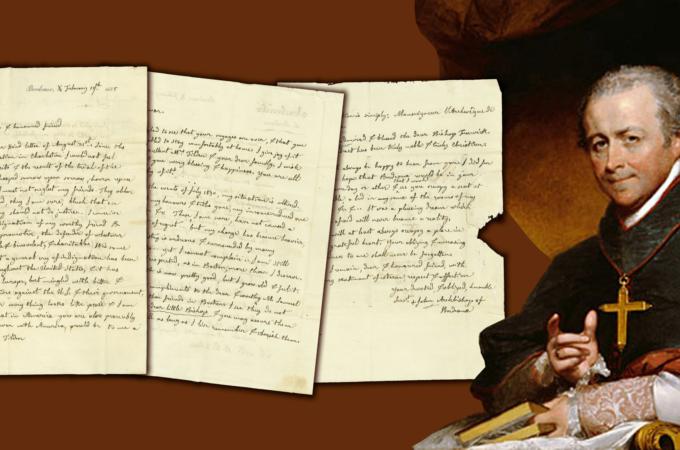Archbishop Cheverus writes to a friend in Boston
On Feb. 19, 1835, Archbishop Jean Cheverus of Bordeaux wrote to Bryant P. Tilden of Boston, revealing his thoughts on the burning of the Ursuline Convent in Charlestown, his present condition as Archbishop of Bordeaux, and appreciation for his friends in Boston.
According to diocesan historians, Tilden was one of several Boston merchants who befriended Father Francis Matignon and Father Jean Cheverus upon their arrival in that city. Many of them traded with France, the West Indies and Canada, so their familiarity with the language and culture made them more naturally inclined to associate with two French priests.
Tilden is also noted for his travels to Baltimore, home of the first diocese in the U.S. While these merchants probably had the means to offer financial support to the priests, it is likely they proved just as valuable as reliable carriers for correspondence and may have even provided passage.
We gain some insight into their relationship in an earlier letter held by the archive, dating to Feb. 27, 1821. In the document, Bishop Cheverus writes to Tilden, wishing him a safe and prosperous journey and, more importantly, permits Tilden to use his name and call upon friends who might aid him in his business. One is Anthony Filichi, a merchant in Leghorn (Livorno) and the other Rev. John Grassi at the Jesuit College in Rome.
Returning to the 1835 letter, Archbishop Cheverus starts by acknowledging his receipt of Tilden's correspondence dated Aug. 21, and that, since receiving news of the "horrid transaction in Charlestown," he did not have the motivation to reply. He admits that "the trial of the ruffians has heaped sorrow upon sorrow, horror upon horror, yet I must not neglect my friends."
He continues the same subject, expressing his disbelief that men who claim to abhor the events can then find the perpetrators not guilty. Later, he praises Bishop Benedict Fenwick for his "noble" and "truly Christian" conduct throughout these affairs.
Archbishop Cheverus then comments on "a general cry of indignation" resounding throughout the United States, and how it has also resounded throughout Europe, "mingled with bitter and unjust invections against the U.S. and their government." He appears to reference tensions over reparations claimed by the U.S. against France for the seizure of ships during the Napoleonic War. "A war with America, would be to me a civil war," he writes, but believes the U.S. is "peaceably inclined" and does not anticipate hostilities.
Archbishop Cheverus then turns to more personal matters, expressing his joy that Tilden has returned from another voyage safely and can now rest comfortably at home with his family. He also comments on his own situation, which has changed "since the events of July 1830," also known as the July Revolution. Since that time, he has lost honors, titles, and seen his income reduced by half. He does not regret these losses, he states, but is more worried by how his responsibilities have grown and become more burdensome to him. "Yet I cannot complain," he concludes, "I am still beloved and respected, as in Boston, more than I deserve."
Finally, he speaks of Boston and the friends he left there upon his departure in 1823. He alludes to frequent correspondence, writing that his friends in Boston "do not forget the dear little Bishop." He asks Tilden to "assure them that I shall as long as I live remember and cherish them." As for Tilden, he hopes to continue corresponding and hopes that one day his business might bring him to Bordeaux. He closes with a lengthy expression of gratitude for Tilden's friendship, stating he will "always occupy a place in my grateful heart."
Archbishop Cheverus would be named a cardinal in February 1836 and died on July 19 of the same year.
- Thomas Lester is the archivist of the Archdiocese of Boston.



















